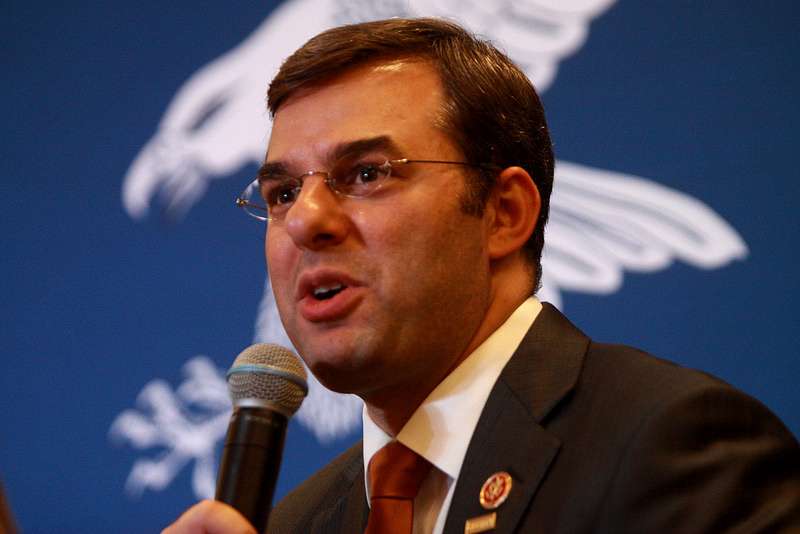Modest NSA Reforms Seem Likely to Pass House Again (UPDATE: It Passes)
Privacy-focused representatives prevented from offering amendments.


Today, the House of Representatives appears set to vote in favor of the USA Freedom Act, legislation that aims to curb some National Security Agency (NSA) surveillance, particularly the mass domestic collection of Americans' telephone metadata, while standardizing and permitting some others and extending components of the PATRIOT Act set to expire.
The outcome of the vote should not be a surprise. The House already voted in favor of an earlier version of this legislation last year, but it failed to make it through the Senate. Now the pressure is on, though, because the surveillance authority claimed within Section 215 of the Patriot Act expires on June 1. The Senate doesn't have the option of doing nothing. Actually, it does. It can let Section 215 expire, but that's clearly not the intent of most of the Senate.
Legislators that want the USA Freedom Act to have even stronger restrictions against surveillance are hosed. Yesterday the House's Rules Committee blocked any representatives from adding any amendments to it. The Hill noted that Justin Amash (R-Mich.), Kevin Yoder (R-Kan.), and Thomas Massie (R-Ky.) had offered up amendments and failed. As such, Amash tweeted last night that he would not be voting for the USA Freedom Act because it still authorizes bulk data collection, just to a lesser extent.
Senate Majority Leader Mitch McConnell is at the moment insistent on trying to keep the PATRIOT Act as it is, but he doesn't seem to have much leverage, despite his position. If the House doesn't go along with him, he'll lose Section 215 entirely. Yesterday the White House declared its support for the USA Freedom Act, and the bill itself was written by Rep. Jim Sensenbrenner (R-Wis.), the original author of the PATRIOT Act, who was aghast to discover it being used to justify bulk surveillance of Americans.
Sen. Rand Paul opposed the original USA Freedom Act because, like Amash, he felt it didn't go far enough to preserve Americans' privacy. Here's what Paul had to say over the weekend about the new legislation:
"I'm not perfectly at home with the USA FREEDOM Act. I voted against it once. The reason I voted against it was that it reauthorized the PATRIOT Act."
He has threatened to filibuster if McConnell attempts to keep the PATRIOT Act as it is, as has Sen. Ron Wyden (D-Ore).
As I've noted previously, the USA Freedom Act has essentially fractured elements of the privacy and tech community. There is clearly a fear that the act, as it stands right now, despite its holes, is the best that can be asked for. But, as we're all well aware, once entrenched, it can be very hard to reform or restrict government programs even further. If the USA Freedom Act passes, there's going to be a significant attitude among many folks that the problems have all been solved and additional reforms would not be needed.
For two different perspectives on the Act, here's a Q&A from the Center of Democracy and Technology explaining why they're supporting the bill while being fully aware of the deficiencies. And here's The Nation hammering home why the bill doesn't nearly go far enough.
This has been a situation where every argument presented by a technology and privacy expert, pro and con, makes sense when I read it, so that's why I've been reluctant to indicate a preference. I have my ideal preference, of course: Section 215 expires forever, and also the entire concept of the "third-party doctrine" (that personal records held by third parties don't require warrants for government access) is tossed out the window and run over by a series of very large trucks. I guess that puts me in alignment more with Paul and Amash, but that simply doesn't seem to be direction we're heading.
UPDATE: Here is a lengthy Facebook post by Amash explaining why he believes the restraints placed by the USA Freedom Act don't actually offer much protection.
UPDATE II: The House version of the USA Freedom Act passed this afternoon with a vote of 338-88.
Editor's Note: As of February 29, 2024, commenting privileges on reason.com posts are limited to Reason Plus subscribers. Past commenters are grandfathered in for a temporary period. Subscribe here to preserve your ability to comment. Your Reason Plus subscription also gives you an ad-free version of reason.com, along with full access to the digital edition and archives of Reason magazine. We request that comments be civil and on-topic. We do not moderate or assume any responsibility for comments, which are owned by the readers who post them. Comments do not represent the views of reason.com or Reason Foundation. We reserve the right to delete any comment and ban commenters for any reason at any time. Comments may only be edited within 5 minutes of posting. Report abuses.
Please to post comments


So what are the consequences to individuals violating the USA Freedom Act? I hope they're more substantial than the punishment for violating the Fourth Amendment.
You want punishment for those who willfully violate our civil rights? If history is any indicator or punishments to come, the very worst violators will be at most given highly paid 'time-outs,' or early retirements, with awesome benefits.
I'm sure it will be based on "whom" the offender is; just as all laws are dealt with.
None. Corporations are not people and have no rights so the Fourth Amendment doesn't apply to them.
/prog
Yay! ...hold it. "Modest" Isn't that just a cute way of saying 'business as usual?'
It's Congress saying "That oughta hold the little SOBs"
It doesn't take much these days.
It's a typo for "mo derp".
The first person to aver the craven, defeatist, hackneyed, intellectually flabby, impractical and tired rubbish "don't let the perfect be the enemy of the good" in response to those who do not support such milquetoast measures set forth in the proposed act will be shot.
Okay.
But when we get a better result from doing nothing (the full expiration of the PATRIOT Act), this law is the enemy of the better.
Not true, unfortunately. Section 215 expires, but not the entire Patriot Act. As well, the NSA believes that it has authority for similar bulk collection under different statutes and executive orders.
Let deadlock reign!
Looks like Rand is primed to get lots of free airtime. We should pitch in and buy him a stadium-buddy.
it still authorizes bulk data collection, just to a lesser extent.
What does that even mean?
I've updated with a link to a lengthy post by Justin Amash about why believes the restraints don't really restrain that much. It will help answer your question, Rich.
Right. The counterargument has been offered by Cato and Reasoner Julian Sanchez, that without the law the NSA will still spy under other authorities, and without any restraints.
Like you, I remain unsure. I'd like a more robust reform, but I'm genuinely confused about whether this will help or not.
I started with my online business I earn $58 every 15 minutes. It sounds unbelievable but you wont forgive yourself if you don't check it out.
For information check this site. ????????? http://www.jobsfish.com